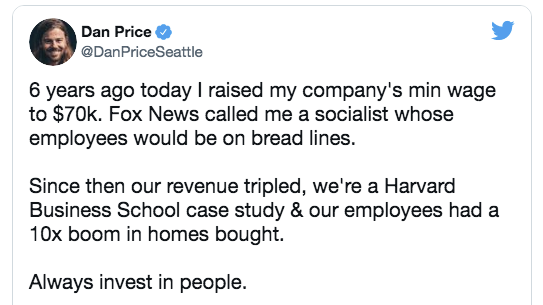


With productivity rates declining in most advanced economies, the question of how to reverse this trend is top of mind for governments and businesses around the world.
Working more hours for less pay isn’t sustainable and one important fact that the global pandemic experience has highlighted is that the people who do some of the most critical jobs to allow our societies to continue functioning are actually amongst those at the bottom of the pay-scale with little job security (think care workers, delivery people, grocery clerks, cleaners, etc).
Even for those that have employment contracts and somewhat better pay (think doctors, nurses, teachers, civil servants, garbage collectors, postal workers, etc), many are struggling with burnout, living in jurisdictions where the cost of housing takes the lion's share of earnings.
Some will also have lengthy and costly commutes, leaving little for other essentials and nothing to deal with unexpected life emergencies.

Pictured: "Many are struggling with burnout, living in jurisdictions where the cost of housing takes the lion's share of earnings."
Stress has become one of the universal aspects of modern life, triggering all kinds of other health and social challenges, in addition to dampening the ability to focus at work, which may have an impact on declining productivity as well.
So, what are governments and businesses doing?
From 2015 to 2019, the Reykjavik City Council and the national government of Iceland ran a series of pilot studies which ended up being the world's largest trial of a shorter working week in the public sector.
The pilot studies included more than 2,500 employees or roughly 1% of Iceland's working population, taking place in pre-schools, offices, social care settings and hospitals. Most of these employees moved from a 40-hour work week to 35 or 36 hours with no reduction in pay.
These employees reported improvements in their health and work-life balance, feeling less stressed and at risk of burnout at work. They also reported spending more time with families and having more time to do household chores and engage in hobbies.
Productivity levels were maintained or improved and the shorter work week was revenue neutral for the public sector. These studies led unions to renegotiate collective bargaining agreements. Currently, 86% of Iceland's working population have moved to shorter hours with no reduction in pay or are in the process of making the transition.

Pictured: "He decided to raise the minimum annual salary for employees at his company to $70,000. His plan would double the salaries of 30 employees and raise the salaries of 40 more who were making less than $70,000."
Trials are now in progress in other countries with Scotland being the latest to announce trials of a four-day work week with no reduction in pay for the public sector.
On the business front, companies have been experimenting with a variety of formats. An interesting example that generated a lot of media attention (both positive and negative) six years ago is that of Dan Price, founder and CEO of Gravity Payments in the US.
Reflecting on discussions he had with an entry-level employee earning $35,000 and a friend who was struggling to balance a two-hour commute with sub-optimal housing, student loans, work and the raising a family on an annual salary of $50,000, he decided to raise the minimum annual salary for employees at his company to $70,000. His plan would double the salaries of 30 employees and raise the salaries of 40 more who were making less than $70,000.
The changes were phased in over three years at a cost $1.8m. Price did not to raise prices, lay off staff, or cut executive pay. More than half the cost was offset by the 90% cut to his own pay. He needed to grow revenue to cover the remaining cost of the changes. So, what's happened since then?
Price reports that his company now has double the number of employees, turnover rate has been cut in half, revenue has tripled and there's been both a baby boom and a ten-fold increase in home ownership. Price set his own pay at $70,000 since implementing the company wide changes. Employee morale and loyalty is high.
A year after implementing the changes, employees presented Price with keys to a Tesla – employees had been secretly contributing to a fund to purchase the car for Price as a gift. During the pandemic when company revenues fell by 55%, employees surprised Price by volunteering to cut their own salaries to ensure that there would be no lay-offs. Price ultimately decided to limit voluntary employee salary reductions to 50% and has since repaid all employees who took a cut as revenues have recovered.

Pictured: "Looking to the experience of government and businesses in other jurisdictions to create options to address Jersey's challenges and seize opportunities may be useful to help crack the productivity puzzle."
According to Mike Wheeler, Professor Emeritus of Management Practice at Harvard Business School who has been following the Gravity Payments story in a series of blog posts: "I'm not saying that every company should or can follow suit.
"I still wonder if this approach can be scaled up. But the way the story has resonated suggests that something is in the air. Wages in many industries have effectively been flat for decades. There are concerns about productivity and the potential impact of automation on the job market. Why haven't we looked harder at employee motivation and engagement?"
Other businesses are looking at different ways to encourage greater productivity. Stephen Aarstol, CEO of Tower Paddleboards, has cut the workday for his employees to five hours, resulting in dramatically improved focus and engagement.
After hearing Price speak, Megan Driscoll, CEO of Pharmalogics Recruiting increased the starting base pay of her employees by 33%. When Driscoll put her plan into effect in January 2016, her business had $6.7m in revenue and 46 employees. Now the staff is 72 and she anticipates revenues of $15m this year.
Coming back to government, Spain is the latest country to announce a three-year trial of a four-day work week where government will provide funding to companies who need support to re-organise workflows and hire additional employees to cover gaps in service. US Congressman Mark Takano has also just proposed federal legislation to move to a 32-hour work week.
How might a deep focus on employee needs lead to greater productivity here? Looking to the experience of government and businesses in other jurisdictions to create options to address Jersey's challenges and seize opportunities may be useful to help crack the productivity puzzle.
This article first appeared in Connect Magazine, which you can read in full HERE.
Comments
Comments on this story express the views of the commentator only, not Bailiwick Publishing. We are unable to guarantee the accuracy of any of those comments.